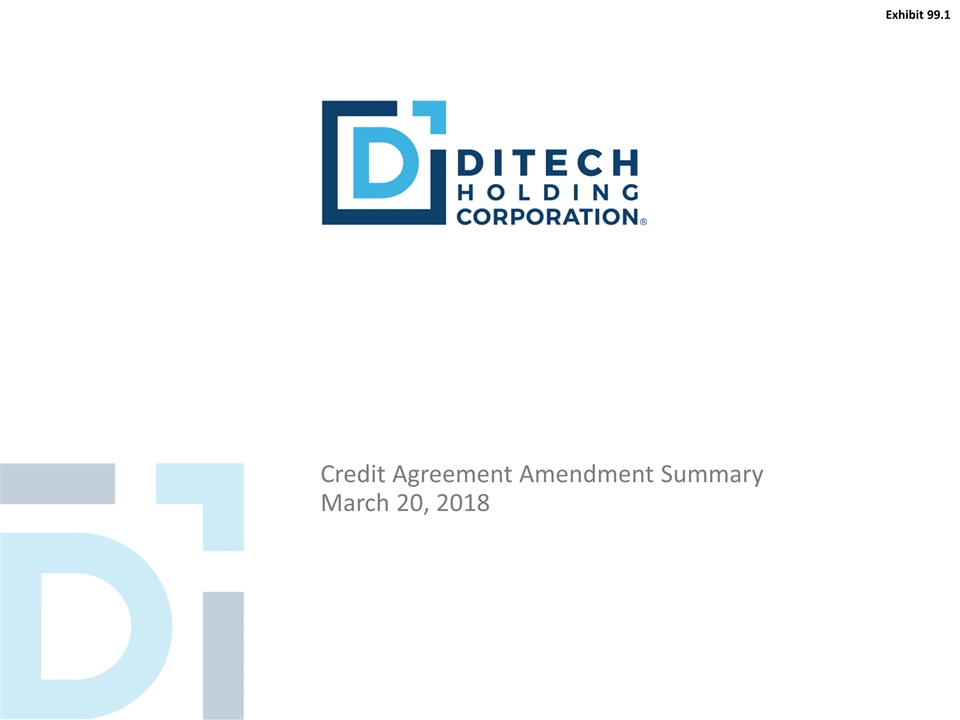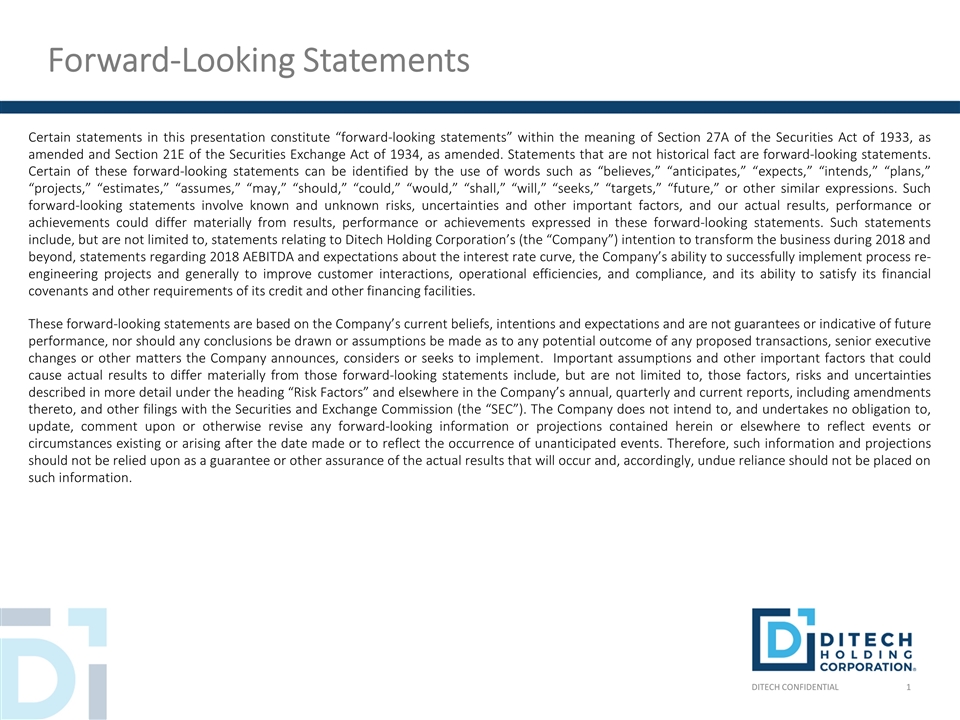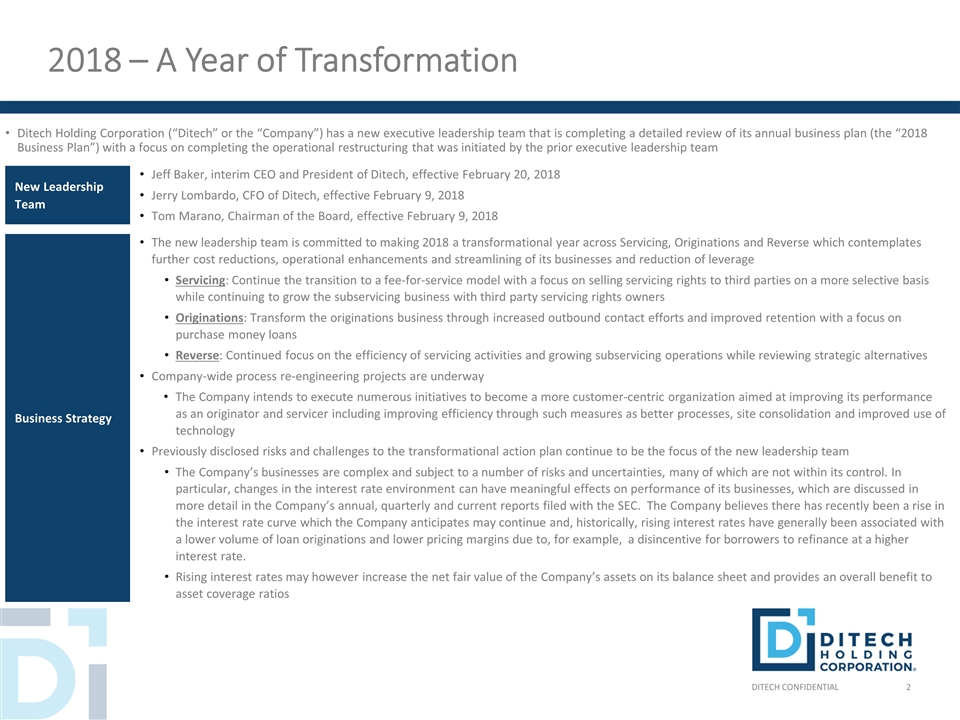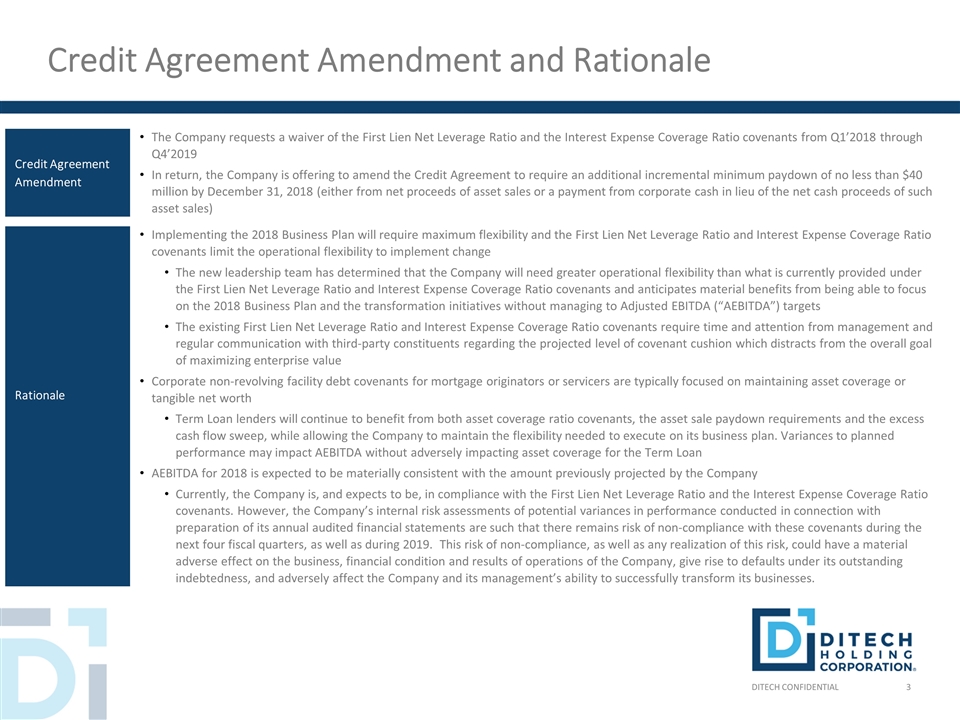Attached files
| file | filename |
|---|---|
| 8-K - FORM 8-K - DITECH HOLDING Corp | d551276d8k.htm |

Credit Agreement Amendment Summary March 20, 2018 Exhibit 99.1

DITECH CONFIDENTIAL Forward-Looking Statements Certain statements in this presentation constitute “forward-looking statements” within the meaning of Section 27A of the Securities Act of 1933, as amended and Section 21E of the Securities Exchange Act of 1934, as amended. Statements that are not historical fact are forward-looking statements. Certain of these forward-looking statements can be identified by the use of words such as “believes,” “anticipates,” “expects,” “intends,” “plans,” “projects,” “estimates,” “assumes,” “may,” “should,” “could,” “would,” “shall,” “will,” “seeks,” “targets,” “future,” or other similar expressions. Such forward-looking statements involve known and unknown risks, uncertainties and other important factors, and our actual results, performance or achievements could differ materially from results, performance or achievements expressed in these forward-looking statements. Such statements include, but are not limited to, statements relating to Ditech Holding Corporation’s (the “Company”) intention to transform the business during 2018 and beyond, statements regarding 2018 AEBITDA and expectations about the interest rate curve, the Company’s ability to successfully implement process re-engineering projects and generally to improve customer interactions, operational efficiencies, and compliance, and its ability to satisfy its financial covenants and other requirements of its credit and other financing facilities. These forward-looking statements are based on the Company’s current beliefs, intentions and expectations and are not guarantees or indicative of future performance, nor should any conclusions be drawn or assumptions be made as to any potential outcome of any proposed transactions, senior executive changes or other matters the Company announces, considers or seeks to implement. Important assumptions and other important factors that could cause actual results to differ materially from those forward-looking statements include, but are not limited to, those factors, risks and uncertainties described in more detail under the heading “Risk Factors” and elsewhere in the Company’s annual, quarterly and current reports, including amendments thereto, and other filings with the Securities and Exchange Commission (the “SEC”). The Company does not intend to, and undertakes no obligation to, update, comment upon or otherwise revise any forward-looking information or projections contained herein or elsewhere to reflect events or circumstances existing or arising after the date made or to reflect the occurrence of unanticipated events. Therefore, such information and projections should not be relied upon as a guarantee or other assurance of the actual results that will occur and, accordingly, undue reliance should not be placed on such information.

Ditech Holding Corporation (“Ditech” or the “Company”) has a new executive leadership team that is completing a detailed review of its annual business plan (the “2018 Business Plan”) with a focus on completing the operational restructuring that was initiated by the prior executive leadership team DITECH CONFIDENTIAL New Leadership Team Jeff Baker, interim CEO and President of Ditech, effective February 20, 2018 Jerry Lombardo, CFO of Ditech, effective February 9, 2018 Tom Marano, Chairman of the Board, effective February 9, 2018 Business Strategy The new leadership team is committed to making 2018 a transformational year across Servicing, Originations and Reverse which contemplates further cost reductions, operational enhancements and streamlining of its businesses and reduction of leverage Servicing: Continue the transition to a fee-for-service model with a focus on selling servicing rights to third parties on a more selective basis while continuing to grow the subservicing business with third party servicing rights owners Originations: Transform the originations business through increased outbound contact efforts and improved retention with a focus on purchase money loans Reverse: Continued focus on the efficiency of servicing activities and growing subservicing operations while reviewing strategic alternatives Company-wide process re-engineering projects are underway The Company intends to execute numerous initiatives to become a more customer-centric organization aimed at improving its performance as an originator and servicer including improving efficiency through such measures as better processes, site consolidation and improved use of technology Previously disclosed risks and challenges to the transformational action plan continue to be the focus of the new leadership team The Company’s businesses are complex and subject to a number of risks and uncertainties, many of which are not within its control. In particular, changes in the interest rate environment can have meaningful effects on performance of its businesses, which are discussed in more detail in the Company’s annual, quarterly and current reports filed with the SEC. The Company believes there has recently been a rise in the interest rate curve which the Company anticipates may continue and, historically, rising interest rates have generally been associated with a lower volume of loan originations and lower pricing margins due to, for example, a disincentive for borrowers to refinance at a higher interest rate. Rising interest rates may however increase the net fair value of the Company’s assets on its balance sheet and provides an overall benefit to asset coverage ratios 2018 – A Year of Transformation

DITECH CONFIDENTIAL Credit Agreement Amendment The Company requests a waiver of the First Lien Net Leverage Ratio and the Interest Expense Coverage Ratio covenants from Q1’2018 through Q4’2019 In return, the Company is offering to amend the Credit Agreement to require an additional incremental minimum paydown of no less than $40 million by December 31, 2018 (either from net proceeds of asset sales or a payment from corporate cash in lieu of the net cash proceeds of such asset sales) Rationale Implementing the 2018 Business Plan will require maximum flexibility and the First Lien Net Leverage Ratio and Interest Expense Coverage Ratio covenants limit the operational flexibility to implement change The new leadership team has determined that the Company will need greater operational flexibility than what is currently provided under the First Lien Net Leverage Ratio and Interest Expense Coverage Ratio covenants and anticipates material benefits from being able to focus on the 2018 Business Plan and the transformation initiatives without managing to Adjusted EBITDA (“AEBITDA”) targets The existing First Lien Net Leverage Ratio and Interest Expense Coverage Ratio covenants require time and attention from management and regular communication with third-party constituents regarding the projected level of covenant cushion which distracts from the overall goal of maximizing enterprise value Corporate non-revolving facility debt covenants for mortgage originators or servicers are typically focused on maintaining asset coverage or tangible net worth Term Loan lenders will continue to benefit from both asset coverage ratio covenants, the asset sale paydown requirements and the excess cash flow sweep, while allowing the Company to maintain the flexibility needed to execute on its business plan. Variances to planned performance may impact AEBITDA without adversely impacting asset coverage for the Term Loan AEBITDA for 2018 is expected to be materially consistent with the amount previously projected by the Company Currently, the Company is, and expects to be, in compliance with the First Lien Net Leverage Ratio and the Interest Expense Coverage Ratio covenants. However, the Company’s internal risk assessments of potential variances in performance conducted in connection with preparation of its annual audited financial statements are such that there remains risk of non-compliance with these covenants during the next four fiscal quarters, as well as during 2019. This risk of non-compliance, as well as any realization of this risk, could have a material adverse effect on the business, financial condition and results of operations of the Company, give rise to defaults under its outstanding indebtedness, and adversely affect the Company and its management’s ability to successfully transform its businesses. Credit Agreement Amendment and Rationale
